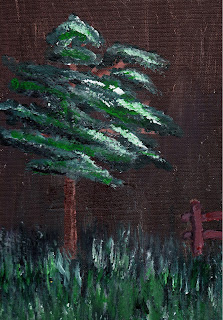 The poem speaks for itself. Someone (likely a
lady) is thinking about a long lost love. A strange tree reminds her of him.
She cuts a flower and desires to send it to him. Unfortunately, it is generally
a worthless flower but only has value in the mind of the beloved. She smells
the tree, sees the tree, but longs for him. She doesn’t want to be forgotten.
Isn’t this what we all want?
The poem speaks for itself. Someone (likely a
lady) is thinking about a long lost love. A strange tree reminds her of him.
She cuts a flower and desires to send it to him. Unfortunately, it is generally
a worthless flower but only has value in the mind of the beloved. She smells
the tree, sees the tree, but longs for him. She doesn’t want to be forgotten.
Isn’t this what we all want?
The beauty of poetry is that it creates a
snap shot in time much like your camera. The snap shot is in your head through
relation of similarity of events in our own lives. You can almost see her
walking in her courtyard thinking. It is almost possible to smell the tree and
feel what she is feeling. This same theme has played over and over in history
in nearly every culture. These are universal feelings and this is why the poem maintains
its attraction today.
Title: In the Garden a Strange Tree
Grows #9/19
In the
courtyard there grows a strange tree,
Its
green leaves ooze with a fragrant moisture.
Holding
the branch I cut a flower from the tree,
Meaning
to send it away to the person I love.
Its
sweet smell fills my sleeves and lap.
The
road is long, how shall I get it there?
Such a
thing is not fine enough to send:
But it may remind him of the
time that has past since he left.
The Nineteen Old Poems go back in history to
the Han Dynasty in 520 CE. It is known as known as the Nineteen Gushi which
means old poetry. No one is sure who the author is but it seems that he was
representing life during his time. Generally such poems are 5-7 syllables and offer
a thesis and an antithesis in most of the works.
The poems were produced during the Han period
whereby the Chinese sought to create a humanistic central government that eventually
collapsed due to internal strife and conflict. Heavy taxes created peasant
revolts which resulted in an execution by a rebel peasant group. They were
successful in the creation of the silk road as well as the first public school
system. Other inventions of the period include the compass, wheelbarrow, and porcelain.
Modern Chinese culture is defined by this period.
You May Read the Book and Analysis Below:
No comments:
Post a Comment